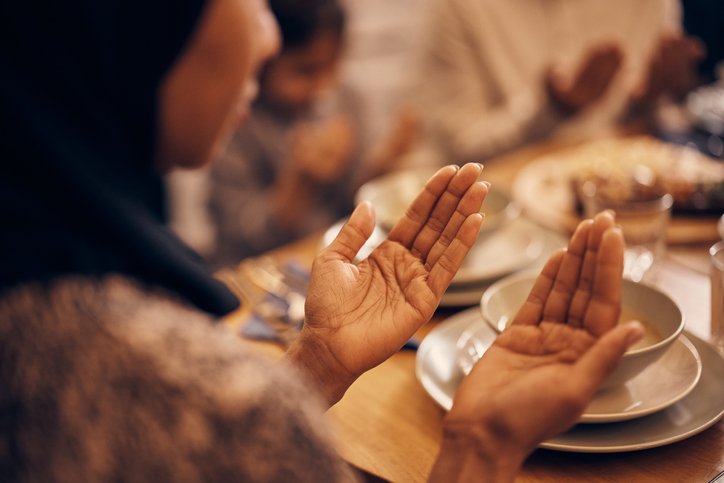Healthy Eating During Ramadan
Ramadan takes place this year from the evening of Sunday, 10 March until Tuesday, 9th April. Ramadan is a holy time for Muslims around the world during which fasting from sunrise to sunset is a requirement for most (but not all) Muslims. Fasting during Ramadan allows Muslims to reflect, practice empathy and connect with their religion.
There are specific foods like dates and samosas that are traditionally eaten during Ramadan for religious and cultural reasons. However, it is still important to meet your body’s nutritional needs during Ramadan while also enjoying these festive foods.
In this blog post, Spectrum Health dietitian, Michaela Carrick, discusses the common challenges with eating nutritiously during Ramadan, and shares some solutions to help you navigate these challenges.
Challenge 1: Feeling thirsty
Yes, fasting during Ramadan also includes abstaining from drinking any fluids between sunrise and sunset. When you don’t drink water during the day, it is easy to get dehydrated.
Solutions:
Eat foods that have water in them like watermelon, cucumber, and oranges at Suhur.
Drink water whenever you can and make sure to have a drink with Iftar and Suhur. Most adults need 2-2.5 litres of water daily.
Soups, smoothies, and milky drinks can help you get extra nutrients like protein and fibre, while keeping you hydrated.
Avoid eating very salty foods like processed meats, crisps, popcorn, or pickles before your fast. Salt can cause you to feel thirstier.
Schedule exercise sessions between Iftar and Suhur whenever possible. This will allow you to drink while exercising.

Challenge 2: Indigestion after Iftar
Iftar can be a big celebration, but eating too much at one time, and too quickly, can cause bloating, discomfort, acid reflux, and an upset stomach.
Solutions:
Start with a few dates and some water to break your fast.
Prepare one plate of food and avoid going back for seconds.
Eat slowly and mindfully. Chew your food well and check in on how hungry you are feeling throughout the meal. Stop eating once you start to feel full.
Eat deep-fried and oily foods like samosas in small amounts. Foods high in fat can trigger gut symptoms.
Challenge 3: Feeling tired
During Ramadan, your sleep routine may change. Getting less sleep and not getting energy from food throughout the day can leave your body feeling tired.
Solutions:
Have starchy carbohydrates like cereal, potatoes, bread, rice, and pasta at Iftar and Suhur. These are broken down more slowly by your body, giving you longer-lasting energy than sugary foods.
Eat fruits of vegetables at each meal. These are a great source of fibre for gut health, vitamins and minerals, and water for hydration.
Make sure you are drinking enough water. Adults need about 2-2.5 litres each day. Dehydration can make you feel tired and unable to concentrate.

Challenge 4: Feeling hungry
It’s not surprising that you will feel hungry while fasting. However, there are some foods that can help you feel more satisfied after your meals that will with suppressing the feeling of hunger for as long as possible.
Solutions:
Choose wholegrain carbohydrates like oats, wholegrain bread, brown rice, and wholegrain pasta at Iftar and Suhur. These are higher in fibre and help you feel fuller for longer.
Eat fruits of vegetables at each meal. These are a great source of fibre for gut health and help you feel full.
Include protein foods like meat, poultry, eggs, dairy, beans, or lentils at each meal or snack. Protein slows down your digestion, helping you stay fuller for longer after eating.
Challenge 5: Overeating sugary snacks and drinks
In many cultures and religions, sugary foods and drinks are part of the celebrations. Everything can be enjoyed in moderation but a diet high in wholegrain carbohydrates, fruits, vegetables, and lean proteins are the key for meeting your nutritional needs.
Solutions:
Use the easy plate guide when serving your meals. Aim to fill your plate with:
½ fruit or vegetables
¼ wholegrain carbohydrates like brown rice or wholegrain bread
¼ lean proteins like chicken, lentils, or low-fat dairy products.
Be mindful of portion sizes. A small portion of your favourite treat can satisfy your craving without limiting your ability to eat fruit, vegetables, protein, and wholegrains.
Choose no added sugar version of sugary drinks like Vimto. You can also try diluting sugary drinks and juices with still or sparkling water.
Ramadan is about a lot more than food, but making small changes like those outlined can really help you to overcome nutritional challenges and feel as energised as possible during this holy month of fasting.
Ramadan Kareem to you and your family and friends, from all of us at Spectrum Health!
Written by: Michaela Carrick, CORU Registered Dietitian with Spectrum Nutrition
If you would like to book an appointment with a Spectrum Health dietitian to help with your nutrition during Ramadan, please click here.















